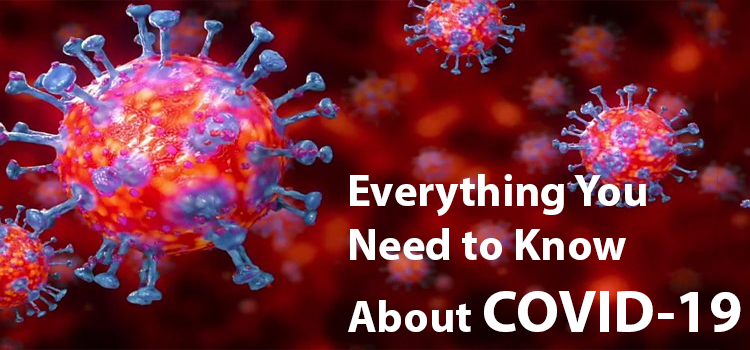Since early 2020, the new Coronavirus outbreak has started taking over the world because of its unusually high speed of transmission. As of now, it has affected about 423,142 people in 194 countries. Therefore, it is very important to know about the types of Coronaviruses and the disease-related symptoms and medication so that you can keep yourself and the people around you safe.
Types of Coronaviruses
Coronaviruses are a large family of viruses that are responsible for causing cold, pneumonia, bronchitis, gut infections and SARS in birds and mammals. These are so-named because of their ‘crown-like’ appearance.
These different types of Coronaviruses can easily infect domestic animals and these animals, in turn, can transmit them to humans. Some common types of these are 229E, OC43, and HKU1 extra. Recently, the virus that has given rise to a new global pandemic is COVID-19.
What Is COVID-19?
This virus-related disease was first discovered in Wuhan, China in 2019. In the beginning, it was assumed that humans became infected through exposure to the seafood market. However, later this assumption was rejected because of the lack of evidence.
As it is transmitted from person to person, it quickly became one of the fastest-growing travel-related diseases in the world. Once the infected people started traveling to other countries, the number of affected people rose exponentially globally.
Symptoms of Coronavirus
Coronavirus symptoms can vary a lot from person to person. In some people, this disease can produce very few or no symptoms at all. In others, it may give rise to high fever and severe respiratory problems. Some common signs are:
- High-fever
- Shortness of breath
- Sore Throat
- Affecting the ability to Smell and Taste
- Fatigue
- Sneezing
- Asthma
Because of the variation in symptoms, it can take about 2 to 14 days to notice the signs. Although no vaccine has been developed for this virus yet it is possible to detect it quite early by taking a test.
How Is It Transmitted?
Although there’s much to be explored in this area, the most recent research reveals that the major cause of its spread is respiratory droplets produced while coughing and sneezing. The virus can affect healthy people in the following ways:
Not Covering the Mouth
Infected people can play a major role in its spread if they don’t cover their mouths while coughing and sneezing. The respiratory droplets can remain in the air and affect other people.
Physical Touch
When an infected person shakes his hand with a healthy person, the virus can affect the healthy person if that person touches his/her face without washing hands.
Contact With Surfaces
People who touch their nose, eyes or lips after touching an infected surface can get infected.
Such people can begin to notice the symptoms of this disease like cough and fever within 14 days. Since this virus can mutate, it can be highly contagious. So, people should take the necessary precautions to prevent its spread.
High-Risk Groups
Based on the evidence, NIH has suggested that the following groups of people are at high risk of becoming seriously ill because of this disease:
- People over 65 years of age
- People with heart diseases
- Lung diseases
- Diabetic People
- Pregnant Women
- People with low immunity
If you have a serious type of cancer like Mouth cancer, it is best to talk to a health care expert if you develop the Coronavirus disease. This is because a change in medication or therapy may be required as a result.
Diagnosis
The disease can be diagnosed by taking the COVID-19 test. If you notice some signs of Coronavirus, you can talk to a health care expert and go to your nearest lab upon advice. The lab technician will take a blood, tissue or saliva sample from your arm, nose or throat. The sample is then tested to see if the virus has incited some response from the antibodies.
Treatment
Unfortunately, there’s no treatment available for this disease currently. However, the severity of the symptoms can be reduced/controlled by taking some medications. Also, infected people can stay away from healthy people to prevent this disease’s spread.
However, people who become infected with other Coronaviruses like SARS or MERS can make use of these vaccines and treatments to become healthy again:
- Antiviral medicines
- Different types of breathing support equipment
- Effective steroids to prevent lungs from swelling
- Plasma Transfusions
Possible Complications
Although many severe complications can arise because of this infection, the most common one of these is pneumonia. Elderly people and people with heart diseases have died in great numbers because of this virus-infected pneumonia.
Besides pneumonia, this disease can cause the following complications:
- Acute Respiratory Distress Syndrome
- Arrhythmia
- Extreme fatigue
- Muscle Inactivity
- Heart attack
How Can This Disease Be Prevented?
Prevention is the key to stop the spread of this virus. Good hygiene measures and social distancing are enough to combat this disease. You can take the following precautionary measures to keep yourself and the people around you safe from it:
If You Are Healthy
Wash Your Hands Frequently
Wash your hands now and then. Make sure to keep washing them for at least 20 seconds to kill all the germs. You can use a hand sanitizer alternatively. But make sure to not touch your face with unwashed hands.
Stay Home
Because this disease is rapidly spreading, make sure to stay home and opt for online learning or work from home options.
If You Are Infected
Stay Home and Don’t Share Your Utensils
Make sure to isolate yourself in a room to safeguard your family from this disease. Keep your dishes and glasses separate and wash them yourself.
Clean the High-Touch Surfaces More Often
Make sure that you disinfect the surfaces you come in contact with like mobiles, doorknobs, and tables often so that nobody at your home is at risk.
Keep Your Mouth and Nose Covered
Make sure that you always wear a mask so that the infect respiratory droplets do not get dispersed in the air when you cough or sneeze.
You do not need to panic if you take these precautionary measures and play your part in preventing the spread. Besides COVID-19, a lot of other types of Coronaviruses can also be prevented from spreading by practicing good hygiene. So, create awareness and don’t spread misinformation in these times of crisis.




